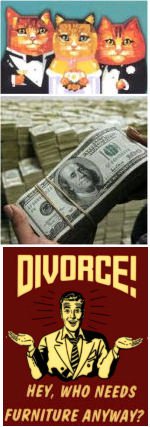“Most people would describe a [US] dollar millionaire as rich, yet many millionaires would disagree,” says a special report in this week’s Economist. They would, not least because a million bucks isn’t what it used to be. The average American house in 2009 cost US$230,000; when Cole Porter wrote the song Who Wants to Be a Millionaire? in 1956, it was US$11,700. A million meant something back then.
One definition of millionaire the Economist offers generously allows you to include the value of your home, art collection and future pension rights. There are 24 million such people in the world today – around one in 200 adults. A more rigorous approach noted by the magazine requires investable assets of US$1 million or more (excluding home). Even with the Fed’s printing presses working 24 hours a day, these high net-worth types are estimated to account for just 10 million of the planet’s 6 billion humans.
The Economist says that while 16% of them inherited their pile, 47% earned it from starting a business. So…
“The typical American millionaire is surprisingly ordinary. He has spent his life patiently saving and ploughing his money into a business he founded. He does not live in the fanciest part of town – why waste money that you can invest? And his tastes are so plain that you can barely tell him apart from his neighbours. He buys $40 shoes, and his car of choice is a Ford.”
Yet there is hope for the timid and idle non-entrepreneurs among us. Some 23% got to millionaire status from paid work, of whom…
“…the vast majority are skilled professionals or managers who have been careful with their money. An orthodontist in America makes about $200,000 a year. He may leave medical school heavily in debt, but after a lifetime of earning, saving and investing, he can probably amass $1m.”
In an old Lonely Planet guide, the authors wrote something like: “When we were living in Hong Kong we could never work out whether we were rich or poor.” It has stuck in my mind all these years. Some people count their net worth in hundreds of millions or more, while others count the days until April when the minimum wage kicks in and they see their pay rising to HK$28 an hour.
How many Hongkongers have a realistic hope of accumulating HK$7.8 million in liquid assets from scratch? I would guess maybe 20% could do it, even among those who are non-entrepreneurs. Yet a far smaller number will actually get there. (As of a year ago, just 7.3% of adult Hongkongers ranked even as HKD millionaires, net of the price tag on their little concrete living box. Barely 1% make the USD league.) It’s their choice, or at least their happily embraced fate. They ignored a number of rules that, if followed, could easily have left them with the magic six zeros on their bank statement. In practice, some of us followed the rules accidentally. Note the past tense there. These rules come with a sell-by date, and it has probably passed. Still, for what it’s worth, I am pleased to reveal…
How to Be (or at least Have Become) a Millionaire Without Being an Entrepreneur and Without Really Trying
1. Don’t get married; don’t have kids. Bang goes millionaire status for most people. Some say marriage improves a woman’s ability to accumulate wealth, but it has wiped out many men I  know: ex-wife got the house, and by then it was too late to build another nest egg from nothing. Even a successful marriage usually comes with those horrendous money-sinks known as kids; in the UK, each one eliminates GBP200,000 of investable funds, and you can’t even hire them out at age six to clean chimneys. Why else can’t that Orthodontist save five years’ salary any faster? You want the glorious blessing, fulfillment and pleasure of children? Fine, but be prepared to sacrifice much hope of millionaire-hood. (Note, by the way, that this list is not titled ‘How to be Happy’.)
know: ex-wife got the house, and by then it was too late to build another nest egg from nothing. Even a successful marriage usually comes with those horrendous money-sinks known as kids; in the UK, each one eliminates GBP200,000 of investable funds, and you can’t even hire them out at age six to clean chimneys. Why else can’t that Orthodontist save five years’ salary any faster? You want the glorious blessing, fulfillment and pleasure of children? Fine, but be prepared to sacrifice much hope of millionaire-hood. (Note, by the way, that this list is not titled ‘How to be Happy’.)
2. Make sure you bought somewhere to live in ages ago before prices became stupid, and you paid it all off soon after, even if it left you with zero at the time. That means somewhere pretty cheap. Remember the self-made American mentioned in the Economist: why waste money you can invest? You want a sea view and room for a Jacuzzi? Fine, but don’t complain when you’re not a millionaire.
3. Make sure you have a fairly well-paying job. It doesn’t have to be a stratospheric, investment-banker income, though it needs to be comfortably into middle-class territory. Just as important: your monthly salary should be at least double, preferably more, than your monthly outgoings. Which means…
4. DON’T WASTE MONEY. Make sure your monthly outgoings are no more than 50% (better still, 40% or 30%) of your monthly income. If you ‘like’ expensive clothing, luxury brand watches, every new electronic gizmo that plummets in price a year later, the trendiest nightspot/resort, the laziest/priciest transport, stop ‘liking’ them, or don’t come whining when you don’t end up a millionaire. Women in particular need to sort out their financially debilitating cosmetics/shoes disorders. It helps to have been brought up by parents who thought it was still 1943. If you need to spend to make other people think you are rich, see a therapist.
OK, now we’re halfway there, hopefully by age 35 or so: no encumbrances to feed, no landlord/mortgage sucking your blood, and significantly more cashflow coming in than going out. This brings us to the interesting bit where miracles happen.
5. Invest. According to a story, someone once asked Albert Einstein what was the most powerful force in the universe, and he replied “compound interest.” Compounding is why the orthodontist mentioned above would have had no problem saving US$1 million in a decade if he hadn’t blown so much on family and mortgage interest. It is why you need to have your home fully paid off fairly early in your working life: your mortgage payments are compounding someone else’s stash.
5. a) Invest in equities. Quick and cheap to trade, flexible, diversifiable, income-producing, low-maintenance investments that mostly grow. It takes some study and thought, but no more than following football or movie stars. If you need to be told to re-invest dividends, you aren’t getting it. (If you prefer real estate, and get a kick out of leverage, stamp duty, lawyers, repairs etc, you’re an entrepreneur, committing the unpardonable sin of putting effort into it.)
5. b) Invest at a time and in a place that in retrospect enjoyed major one-off boosts from historic shifts in global economic patterns. The 1990-2010 period in Hong Kong was pretty hard to beat, with globalization, new technology and the rise of China.
5. c) Follow the usual rules. Invest in a blend of boring and mildly adventurous equities. (On average, if you put $10,000 into each of five reasonably considered stocks, maybe one will be a dud, three will perform OK and one will boom. The dud can’t fall more than $10,000; the one that booms can go to $50,000, $70,000 or more. Maybe 70% of returns come from 30% of the portfolio.) Prefer good managements. Prefer companies in industries with high entry barriers. Most of all, let time do the work. And so on.
5. d) Understand timing and psychology. Example 1: Make the most of mayhem. Events like 9/11, SARS and the 2008 crash were singular buying opportunities when the herd was rushing to sell. Buy heavily at such times, and everything else just falls into place. A strong stomach and cold blood help. Example 2: Distinguish trends, fads and bubbles. Emerging markets might fade as flavour of the month, but the strategic long-term case is simple. A stupid investment can be a good one (for a while) if enough idiots are deluding themselves into thinking it’s a good one, as the recent gold price shows.
And there you have it. Your housing is paid for, there’s no screaming family to grab-grab-grab, the Hong Kong government is happy with its annual 15%, you earn decently, you save and you invest. Oh, and it’s the 1990s and 2000s. It could be $100,000, $1 million or $10 million, depending on your circumstances: the point is, if you haven’t accumulated at least 10 years’ salary from zero in (say) a decade and a half, you haven’t tried.
Looking back, it was almost impossible to fail. But how to do it from 2011 onwards, I have no idea.


“If you need to spend to make other people think you are rich, see a therapist.”
That would pretty much put the entire local “conspicuous consumption – look at my LV bag – I can afford this expensive bowl of endangered species – my little brother is obviously much bigger than yours” population into years of intensive therapy.
Indeed. A childhood home in Kellett View was about 8-9 million at the time. Now 200M is what you need.
Gold was 3000 a Tael, and HSBC was something like 20 before the “split”.
Affordability has drifted away from the the HK middle class to the point that what were one Old Peak Road buyers are now Sai Ying Pun & Kennedy Town folk.
You are 100% right when you say that you could not fail given the period of time. Today, however, is so very different. Soon the only way will be down.
To be that guy that buys cheaply and pays his home off before 35 on a middle class salary…I thing we talking about a life in Yuen Long or Sha Tin with one room.
“It helps to have been brought up by parents who thought it was still 1943.”
I always wondered what was up with me & my husband. Now I realize that our parents, although distant is space were synced in time; and we’re the same way w/ our kids (little money-sinks that they are).
Your justification of yourself as a self-satisfied misogynist, child-hating, dog-kicking, oldie expat reactionary bourgeois is illuminating if slightly boring.
As usual.
When did you last have an original thought?
You are the loudest cipher in Central.
What’s with the self-flagellating commenters who feel the need to read and comment on a site they plainly don’t like? Is this some sort of self-inflicted-yet-resented penance for heinous sins they’ve committed in the past, like kiddie fiddling?
Is Berni a tad bitter? Short of a few bob?
Where’s Ronald Arculli? I have not seen him for ages. Is he going the way of Stan?
I have done just about every thing wrong according to the Hemlock Rules of Wealth. Well, time still moves forward though…..
Ref. rule no.1. How does this work for Stanley Ho? Is he the exception that proves the rule? Unfortunately he seems to have made so much that it has encoraged a whole scrounge* of ungrateful spouses and offspring to want to grab a slice of it – even before he is laid to rest.
*collective noun for parasitic or leeching relatives
Spawn of evil descending to feast on the devil’s still twitching cadaver, or maybe just old Stan having some fun and pulling everybody’s chain.